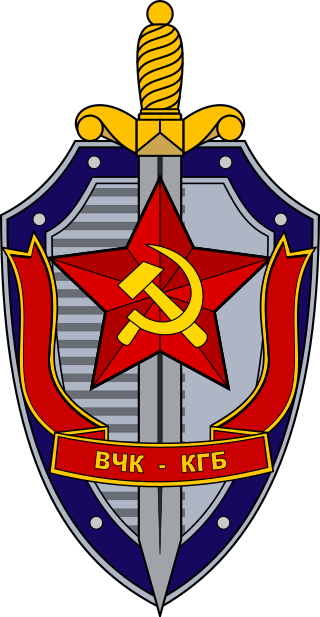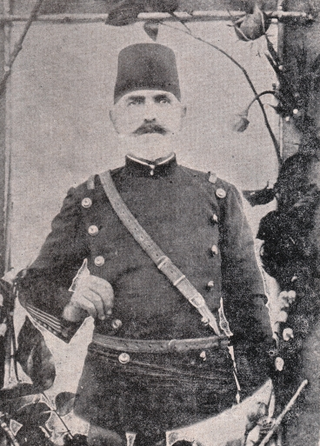Related Research Articles

Espionage, spying, or intelligence gathering is the act of obtaining secret or confidential information (intelligence). A person who commits espionage is called an espionage agent or spy. Any individual or spy ring, in the service of a government, company, criminal organization, or independent operation, can commit espionage. The practice is clandestine, as it is by definition unwelcome. In some circumstances, it may be a legal tool of law enforcement and in others, it may be illegal and punishable by law.

The Federal Security Service of the Russian Federation is the principal security agency of Russia and the main successor agency to the Soviet Union's KGB; its immediate predecessor was the Federal Counterintelligence Service (FSK) which was reorganized into the FSB in 1995. The three major structural successor components of the former KGB that remain administratively independent of the FSB are the Foreign Intelligence Service (SVR), the Federal Protective Service (FSO), and the Main Directorate of Special Programs of the President of the Russian Federation (GUSP).

The Foreign Intelligence Surveillance Act of 1978 is a United States federal law that establishes procedures for the surveillance and collection of foreign intelligence on domestic soil.

An intelligence gathering network is a system through which information about a particular entity is collected for the benefit of another through the use of more than one, inter-related source. Such information may be gathered by a military intelligence, government intelligence, or commercial intelligence network.

The caliphate of the Ottoman Empire was the claim of the heads of the Turkish Ottoman dynasty to be the caliphs of Islam in the late medieval and early modern era. During the period of Ottoman expansion, Ottoman rulers claimed caliphal authority after the conquest of Mamluk Egypt by sultan Selim I in 1517, which bestowed the title of Defender of the Holy Cities of Mecca and Medina upon him and strengthened the Ottoman claim to caliphate in the Muslim world.
This article covers the history of Polish Intelligence services dating back to the Polish–Lithuanian Commonwealth.
The Australian Intelligence Community (AIC) and the National Intelligence Community (NIC) or National Security Community of the Australian Government are the collectives of statutory intelligence agencies, policy departments, and other government agencies concerned with protecting and advancing the national security and national interests of the Commonwealth of Australia. The intelligence and security agencies of the Australian Government have evolved since the Second World War and the Cold War and saw transformation and expansion during the Global War on Terrorism with military deployments in Afghanistan, Iraq and against ISIS in Syria. Key international and national security issues for the Australian Intelligence Community include terrorism and violent extremism, cybersecurity, transnational crime, the rise of China, and Pacific regional security.

NSA warrantless surveillance — also commonly referred to as "warrantless-wiretapping" or "-wiretaps" — was the surveillance of persons within the United States, including U.S. citizens, during the collection of notionally foreign intelligence by the National Security Agency (NSA) as part of the Terrorist Surveillance Program. In late 2001, the NSA was authorized to monitor, without obtaining a FISA warrant, phone calls, Internet activities, text messages and other forms of communication involving any party believed by the NSA to be outside the U.S., even if the other end of the communication lays within the U.S.
Warrantless searches are searches and seizures conducted without court-issued search warrants.

The Constitution of the Ottoman Empire was the first and only constitution of the Ottoman Empire. Written by members of the Young Ottomans, particularly Midhat Pasha, during the reign of Sultan Abdul Hamid II, the constitution was in effect from 1876 to 1878 in a period known as the First Constitutional Era, and from 1908 to 1922 in the Second Constitutional Era. After Abdul Hamid's political downfall in the 31 March Incident, the Constitution was amended to transfer more power from the sultan and the appointed Senate to the popularly-elected lower house: the Chamber of Deputies.

The Directorate of Military Intelligence is the military intelligence branch of the Defence Forces, the Irish armed forces, and the national intelligence service of Ireland. The organisation has responsibility for the safety and security of the Irish Defence Forces, its personnel, and supporting the national security of Ireland. The directorate operates domestic and foreign intelligence sections, providing intelligence to the Government of Ireland concerning threats to the security of the state and the national interest from internal and external sources.

The Protect America Act of 2007 (PAA),, is a controversial amendment to the Foreign Intelligence Surveillance Act (FISA) that was signed into law by U.S. President George W. Bush on August 5, 2007. It removed the warrant requirement for government surveillance of foreign intelligence targets "reasonably believed" to be outside the United States. The FISA Amendments Act of 2008 reauthorized many provisions of the Protect America Act in Title VII of FISA.

Abdulhamid or Abdul Hamid II, was the 34th sultan of the Ottoman Empire from 1876 to 1909, and the last sultan to exert effective control over the fracturing state. He oversaw a period of decline, with rebellions, and presided over an unsuccessful war with the Russian Empire (1877–78), followed by a successful war against the Kingdom of Greece in 1897, though Ottoman gains were tempered by subsequent Western European intervention.

The Committee for State Security (CSS) was the main security agency for the Soviet Union from 13 March 1954 until 3 December 1991. As a direct successor of preceding agencies such as the Cheka, GPU, OGPU, NKGB, NKVD and MGB, it was attached to the Council of Ministers. It was the chief government agency of "union-republican jurisdiction", carrying out internal security, foreign intelligence, counter-intelligence and secret police functions. Similar agencies operated in each of the republics of the Soviet Union aside from the Russian SFSR, where the KGB was headquartered, with many associated ministries, state committees and state commissions.
The Hamidiye regiments were well-armed, irregular, mainly Sunni Kurdish but also Turkish, Circassian, Turkmen, Yörük, and Arab cavalry formations that operated in the south eastern provinces of the Ottoman Empire. Established by and named after Sultan Abdul Hamid II in 1891, they were intended to be modeled after the Cossacks and were supposedly tasked to patrol the Russo-Ottoman frontier. However, the Hamidiye were more often used by the Ottoman authorities to harass and assault Armenians living in Eastern Provinces of the Ottoman Empire.

Former U.S. President Barack Obama favored some levels of mass surveillance. He has received some widespread criticism from detractors as a result. Due to his support of certain government surveillance, some critics have said his support may have gone beyond acceptable privacy rights. This is of course a debatable conclusion. Many former US presidents have increased the abilities and techniques used for intelligence gathering. President Obama released many statements on mass surveillance.
The Estonian Foreign Intelligence Service is the foreign intelligence service of the Republic of Estonia. The Foreign Intelligence Service coordinates with all Estonian intelligence functions, collects intelligence concerning foreign interests and activities, and transmits information to the President, Prime Minister, the General Staff of the Estonian Defence Forces, the Interior Minister, the Foreign Minister, and the Minister of Defence.

Shemsi Pasha (1846-1908) was an Ottoman-Albanian general.
The United States established relations with North African countries and with the Ottoman Empire after 1780.

Yıldız Intelligence Agency was founded in 1880 by the Ottoman Sultan Abdul Hamid II, two years after he took office. It was the first organized intelligence agency in Turkish history, and was named after Yıldız Palace, the palace Abdul Hamid II resided in.
References
- ↑ Kafescioğlu, Çiğdem. Constantinopolis/Istanbul: Cultural Encounter, Imperial Vision, and the Construction of the Ottoman Capital. University Park, PA: Pennsylvania State UP, 2009. Print.
- ↑ Ágoston, Gábor, and Bruce Alan Masters. Encyclopedia of the Ottoman Empire. New York, NY: Facts On File, 2009. Print.
- ↑ Satia, Priya. Spies in Arabia: The Great War and the Cultural Foundations of Britain's Covert Empire in the Middle East. Oxford: Oxford UP, 2008. Print.
- ↑ Ibrahim Al-Muwaylihi, Ma Hunalik (1895), transl. Roger Allen, 77-85, 129-132.